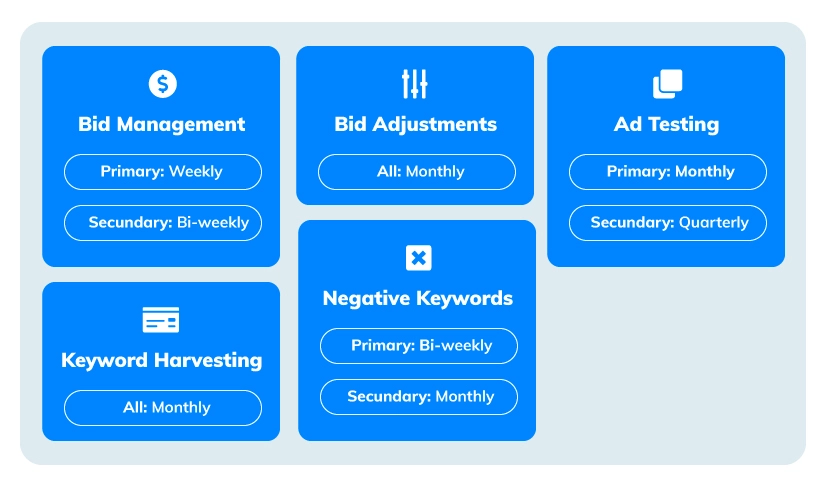[display-name-category]
[post_author]
[wtr-time]
In life, as in PPC, check-ups are essential. PPC auditing is vital to measure performance and pinpoint any issues with campaigns. More importantly, regular monitoring can show you which adjustments are required to get better leads.
PPC audits strengthen your relationship with clients and allow your sales team to glide through some of the common frustrations of many paid advertising campaigns.
Join us as we review the most common auditing mistakes that could hurt your campaigns in the long run and learn what to look out for and how to adjust your auditing process immediately.
Mistakes to Avoid for Better PPC Auditing
Skipping Conversion Tracking
Now, there are two issues related to tracking —some neglect conversion tracking while others don’t verify its proper function.
- Not seeing data? Are tracking codes set up correctly?
- What are your conversions tracking if your conversions are high, but sales are low? Be wary of this result and verify that you are tracking the correct actions.
- Are you double-tracking? A common mistake because sometimes tracking codes are duped through Google Analytics and Google Ads. Watch out for this, as it creates inaccurate reports.
If you set up tracking codes, make sure that you measure engagement accurately. They should provide the data to understand the return on investment and make pitches all the more convincing for your clients.
![]()
Keyword Relevancy and Unnecessary Spend
Your PPC audit will provide insight into the keywords associated with your prospects’ campaigns. The most common issues that PPC auditing reports help to flag are:
- Keywords aren’t set up correctly. This error won’t reveal itself until it hurts CTR. So, how can you identify this issue? Ask these questions:
- Have any keywords been repeated?
- Are there too many random keywords per ad group?
- Are your keywords relevant to their ad group and landing page?
- Negative Keywords are not leveraged, and the wrong keywords have used up your ad spend. If this is the case, your team can step in to explain the importance of avoiding impressions and clicks outside of their target audience.
AdInsights can help you review these keywords and make the most effective recommendations for prospective clients.
Insufficient Optimizations
A paid search campaign left on autopilot without monitoring is like not watering a plant for an extended period. Sooner or later, it’ll wilt and die. Attention is required.
Regular optimizations are important in PPC because the platform features continually evolve. Once launch periods are set aside, expert advertisers make it a point to keep an account on an optimization schedule. Consider the size of your account before proposing a schedule. Larger accounts need to gather more data and review it more frequently.

Here is an idea of how our PPC experts break down optimizations:
- For weekly optimizations, reviewing bids and budgets is the most critical activity. Also, take a look at the search terms report. Consider adding negative keywords (or negative placements if it’s display or video) weekly.
- For bi-weekly optimizations, review keywords and targeting (location, ad schedule, devices, demographics, audiences). Two weeks is the right margin to check results, so feel free to take action based on this data. This is usually the time it takes automated bid strategies to finish the learning period and work effectively.
- Focus on ad copy performance for monthly optimizations (or a few weeks over). If reviews reveal underperforming assets such as ads, keywords, ad groups, or campaigns, consider pausing them. Create new ads and look into improving the campaign/account structure if applicable.
Check results from the last 30 days because the time frame allows the algorithm to run automated bidding strategies such as Target CPA or Target ROAS. A month’s worth of data can help you adjust your targets to bid more efficiently. These changes will affect campaigns and insights. Creating a schedule that considers when and how to optimize settings is key.
Choosing the Wrong Bidding Strategy
Manual CPC allows advertisers stronger control over how much they pay per click. Keep a close eye on how the campaign, ad groups, and keywords perform and suggest adjustments.
Review performance at various levels: location, ad schedule, audiences, and devices.
Some common pitfalls include:
- Budgets with too high and limited data can burn a hole through your clients’ pockets.
- Not enough budget will prevent performance insights and competitiveness.
On the other hand, automated bidding is based on data, but advertisers must be careful with which information they use to fuel their decisions. Emphasize how essential it is to monitor and direct its course to improve its ability to help PPC campaigns. To learn more about controlling CPCs manually and leveraging automation, visit this link.
Using Automation with a Set and Forget Mentality
Automation management helps bids and shortens audience, copy, and image display processes. Naturally, this frees up time to focus on other aspects of an account, allowing strategists to work smarter, not harder.
However, mistakes arise when these tools are left to a “set and forget” mode. We stress the importance of monitoring these tools to help them “learn.” Without constant updates and optimizations, campaigns will veer off course.
Enhance Your PPC Audit Process with Automated Tools
We perfected our audit processes and elevated our pitches by doing our homework before creating an audit tool to help sales teams effortlessly capture leads. Our PPC software goes above the standard to help your PPC sales team understand their auditing process errors. This service allows agencies to scan any Google Ads or Microsoft Advertising account in your portfolio and, within minutes, retrieve a detailed and actionable audit that they can share with any prospect who is ready to sign the dotted line.
Happy PPC Auditing
As we all know and have mentioned repeatedly, PPC check-ups are essential to keeping your clients’ advertising campaigns in check. Account audits help teams pinpoint potential problems and adjust their approach for better results.
Stay in touch and receive more tips on PPC auditing and tools by signing up for our blog.







